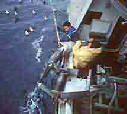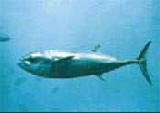|
"I'm not an expert on what our oceans can sustain," said Todd Gray, chef at Equinox, who hasn't served swordfish since 1995 and has signed on to a campaign not to serve Chilean sea bass, but serves seafood subject to other boycotts. "There has to be more in-depth information and scientific research given to us about these issues."
The rationale for the push toward restaurant boycotts is simple, explains Tom Grasso, U.S. director for marine conservation at the World Wildlife Fund. Many of the world's oceans are being overfished, to the degree that certain species of fish might become endangered. While government regulations are supposed to protect against overfishing, politics sometimes hinders those efforts, and plenty of poachers don't have much regard for the rules anyway.
Hence, Grasso argues, persuading chefs and consumers to hold back is the best way to ensure that, 50 years from now, mankind will still be eating Patagonian toothfish, a mild-tasting fish from the coast of Antarctica that soared in popularity when marketers
started calling it Chilean sea bass. American consumers last year
bought 19.8 million pounds of the fish, spending around $750
million for it, according to an analysis of government data by the
National Environmental Trust.
Grasso said that chefs and consumers of seafood "have to take
responsibility to ensure that the fisheries of the world have a healthy future," adding that regulators, fishermen and others must keep working on the issues, too.
"In the food world, chefs are the opinion leaders," said Andrea Kavanagh, who heads the "Take a Pass on Sea Bass" campaign for the National Environmental Trust. "Chefs spend a lot of time thinking about what goes on their menus, researching where it comes from. They care about sustainability, too."
Others argue that it is unrealistic -- and downright unscientific -- to expect chefs and consumers to figure out which kinds of fish are threatened and should be avoided.
"Restaurants shouldn't have to be in this position," said Thor Lassen, president of Ocean Trust, a research group funded in part by the fishing industry. "These are science issues, not culinary issues."
He argues that restaurateurs and environmental groups should have more faith in the regulatory process so that some fisheries are not put out of business.
Of course, many chefs are entirely happy to do the research on what foods are environmentally sound, then act on it. Fernando Giacomini, chef at McCormick & Schmick's Seafood Restaurant in downtown Washington, avoids Chilean sea bass and Atlantic swordfish.
"We sell a pretty high volume, so we can make a difference on these things," he said. "People really seem to like Chilean sea bass. But I despise it, not just because of the environment. It's the hot dog of the sea. You can cook it for 10 hours and it still tastes the same."
Local restaurateurs wrestling with the issue say they are doing so despite receiving little or no pressure from their customers. While a few diners may occasionally complain about the lack of a favorite fish on the menu, the restaurateurs interviewed for this article said none of their patrons has complained about the presence of politically incorrect seafood on the menu. Rather, chefs act out of concern for the long-term availability of their favorite fish.
"The public in general has a small in-box for a lot of this stuff," said Wade Wiestling, chef at the Oceanaire Seafood Room on F Street NW, during the panel discussion Monday night.
The recent push for restaurants to become arbiters of acceptable seafood is only the latest in a series of such public-pressure campaigns. In the 1980s, celebrity chef Paul Prudhomme made blackened redfish a popular dish nationwide, to the point that populations of Louisiana redfish dwindled to dangerously low levels -- and many chefs stopped serving it, both to save the redfish and because a prohibition on commercial fishing left them with little choice.
Similarly, in the early 1990s the rockfish population in the Chesapeake Bay dwindled, prompting restaurants to remove it from menus and regulators to respond. Now, rockfish are thriving again and the fish has reappeared on menus.
In the mid-1990s, many chefs pulled back on using swordfish when the population of the fish dwindled in the Atlantic. With swordfish populations on the rise, environmentalists point to it as an example of the success that can come from putting pressure on businesses.
Lassen sees it differently. As he argues it, when high-end restaurants stopped buying Atlantic swordfish, it puts the most responsible American fishermen out of business, leaving the waters to fishermen from other countries who had less inclination to avoid overfishing. Eventually, he said, it was international regulations that drove the swordfish population back up.
And what about an issue that is often most on the minds of restaurateurs trying to make a buck -- finding dishes that taste good? Might exorcising threatened species from menus take the fun out of a meal?
"There's so much wonderful, sustainable fish available," said Gray, whose restaurant is a favorite of food critics, "that I think we have plenty of options of things that taste good to go on menus."
© 2002 The Washington Post Company
|


